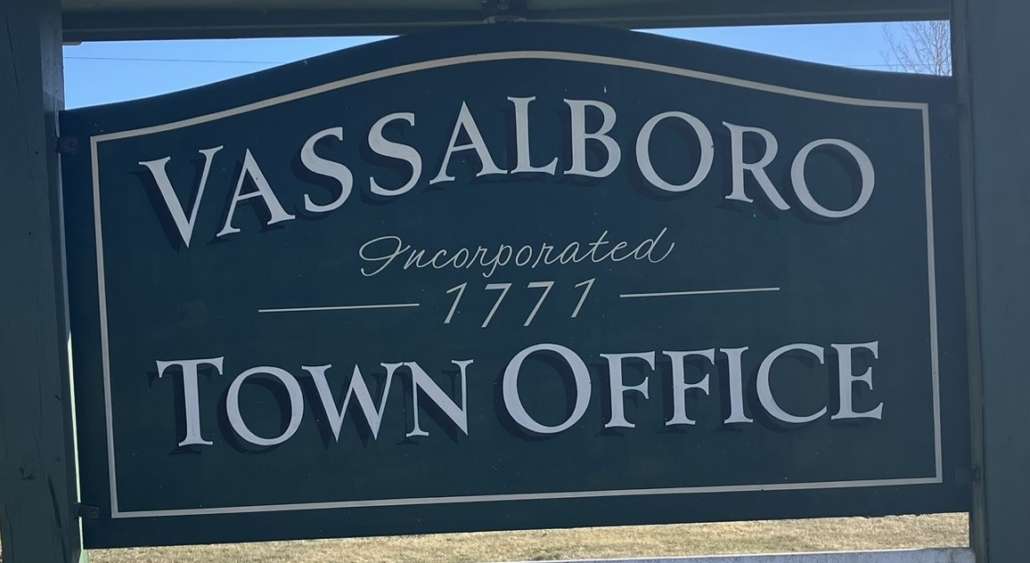At their June 30 meeting, China select board members got information on the China Food Pantry, the Golden Agers and the China Village volunteer fire department. They appointed municipal officials and board and committee members for the fiscal year that began July 1.
The only contentious issue was a proposed no-parking ordinance for Peking and Canton streets, in China Village. Board members approved it unanimously after a sometimes heated discussion among residents.
Town Manager Rebecca Hapgood raised the issue, after she drove by Peking Street last month when one of contractor Lance Robitaille’s trucks was parked so as to block it. Concerned about emergency access, Hapgood suggested an ordinance.
At the June 30 meeting, select board members had a letter signed by half a dozen residents of the two streets supporting a no-parking ordinance, for safety and historic reasons. The letter described the roads as laid out to be one rod – 16.5 feet – wide (in fact narrower) and labeled them part of the “distinctive charm and cultural value” of the China Village Historic District.
Another concern is plowing the narrow streets. Select board members amended the ordinance to ban parking on the pavement in the summer and in the wider right of way from Nov. 1 to April 15.
Robitaille said the truck that attracted Hapgood’s attention had been parked briefly by an employee stopping to pick up tools. He blamed himself for not telling the employee to park off the pavement.
Four years ago, Robitaille said, he got approval from Codes Officer Nicholas French and Public Services Director Shawn Reed to gravel the side of his lawn on Peking Street. His vehicles should now be parked off the pavement on the gravel, or on a Causeway Road property he has arranged to use, where he hopes to negotiate additional space.
To Canton Street resident Norma Wilkinson’s complaint that trucks had “chewed up” her yard at the corner where Peking and Canton streets intersect, Robitaille replied not his trucks: maybe oil or other delivery trucks. He offered to repair the damage, if the town asked him to and if Wilkinson authorized him to work on her property.
Robitaille also said he is willing to plow and sand Peking and Canton streets any time town trucks cannot.
China Community Food Pantry supporters also had a letter for select board members, presented by Thomas Parent, chairman of the organization’s board. He explained that after 33 years of operation from the Lakeview Drive home of the late Lee Austin and his widow, Ann, the pantry managers are looking for a new space to rent or buy.
The food pantry serves about 125 families in a typical year, averaging about 75 families a week, many including children and/or senior citizens. Until now, it has depended on donations. Parent estimated monetary donations at around $15,000 a year, plus in 2024 about a million dollars worth of donated food, from area Hannaford stores and other stores, local growers, the Winslow Food Pantry and the state-wide Good Shepherd Food Bank.
Food donations may decrease as government programs are cut. A new space is expected to cost at least $45,000 a year, added to ongoing expenses like insurance and running the organization’s van. For these reasons, Parent said, Food Pantry officials intend to apply for town funds for the 2026-27 fiscal year.
Parent requested no immediate action; select board members took none.
To donate
The China Community Food Pantry and the Golden Agers welcome donations.
The China Community Food Pantry is awaiting Internal Revenue Service approval for tax-exempt status (having previously been tax-exempt under the umbrella of the New England Yearly Meeting of the Religious Society of Friends). Its mailing address is PO Box 6012, China Village, ME 04926.
Information on the Golden Agers, including how to donate, is available from Sheldon Goodine, whose telephone number is (207) 215-9780.
Sheldon Goodine, speaking for the Golden Agers, said the group started with eight members and now has 67. He thanked select board members for sponsoring the organization and providing a meeting place in the portable building behind the China town office.
In addition to Wednesday morning meetings, Goodine said last year the group took four bus trips to Maine attractions, and more are planned this summer. Donations to fund bus rental are welcome.
China Village Fire Chief Joel Nelson sought select board support for funding for a new fire truck. He had one quote, for almost $490,000.
Select board members recommended continuing to seek grants – Nelson listed several the department has received recently for equipment and supplies, but said he has been unable to find one for a fire truck – and looking for an acceptable used truck. Meanwhile, they tabled the issue.
Many residents were reappointed to town positions, like Hapgood as town manager and her other jobs, and to town boards and committees. Board members made one change, appointing Edwin Bailey representative to the Kennebec Valley Council of Governments General Assembly (succeeding former select board member Janet Preston). They reappointed Blane Casey as alternate.
A Freedom resident’s application to join the China Community Forest Committee was rejected, with only Jeanne Marquis voting in favor. Board Chairman Wayne Chadwick voted against all non-resident volunteers, because he thinks only tax-payers should be involved in decisions that could cost tax money.
In other business, Hapgood reported that China resident Noah Rushing, a University of Maine at Orono junior next year, has been hired as China’s summer Economic Development and Community Enhancement Coordinator.
The manager said China received a check from FirstPark, the Oakland business park the town has been a member of since it was created, in the amount of $26,821. China’s 2024-25 contribution to the park was $26,987 – a cost of $166 for the year.
The next regular China select board meeting is scheduled for 6 p.m., Monday, July 14.





 The selectboard has voted to allow the closure of the Dam Rd., in Vassalboro, due to construction at the Webber Pond dam. The earliest date for bridge closure is Monday, July 15, according to Maine Rivers Project Manager Matt Streeter.
The selectboard has voted to allow the closure of the Dam Rd., in Vassalboro, due to construction at the Webber Pond dam. The earliest date for bridge closure is Monday, July 15, according to Maine Rivers Project Manager Matt Streeter.


